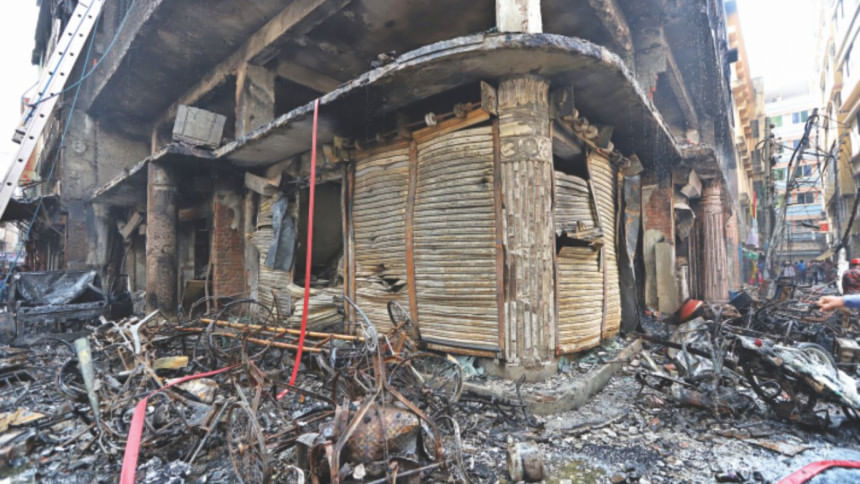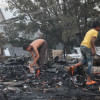Nimtoli to Chawkbazar

On the morning of the national holiday yesterday, many people woke up to find their Facebook friends “marking themselves safe from Chawkbazar fire”.
By the time they turned on their TVs, at least 50 people were reported dead in the deadly blaze that broke out in a building on a shabby alleyway in Old Dhaka. Within minutes, the toll climbed to 67.
Many must have found how strikingly similar this fire was to the one that razed a chemical warehouse in Nimtoli, also in Old Dhaka, which claimed 124 lives nearly nine years ago.
Even Health Minister Zahid Malik said, “The Chawkbazar fire incident is a repetition of the one that occurred in Nimtoli.”
What could have been done to avoid such a massive loss of life and property? Has the government done the bare minimum? Why such accidents happen over and over again? Such questions remain in people's mind.
Hours after the firefighters brought the blaze under control, Industries Minister Nurul Majid Mahmud Humayun yesterday said, “The chemical business in Old Dhaka has been a family business. It's like a family tradition. They don't want to go far. A lot of issues are related to this. I'm from Old Dhaka. I know this very well.”
According to media reports, there are more than 25,000 chemical warehouses in Old Dhaka, of which around 15,000 are in residential buildings. Fire service officials said only around two percent storehouses have permission from the city corporation.
Most of the warehouses store chemicals and dyes, largely used in readymade garment (RMG) and textile factories.
One of the main reasons behind the concentration of such storehouses in Old Dhaka is their cheaper rent compared to those in other parts in the city. Besides, their locations also help businesses cut the chemical transportation costs.
Old Dhaka is also known as a hub for counterfeit perfume products, including scent and deodorant. Numerous warehouses have been set up to store counterfeit products.
Storehouses are built in some almost unreachable and undiscoverable rooms and buildings, meaning these are inaccessible to firefighters.
“Around 98 percent of the chemical warehouses are illegal and they operate at night. We had warned them several times, but in vain,” Fire Service and Civil Defence Director General Ali Ahmed told The Daily Star.
After the Nimtoli fire in 2010, the government had pledged to relocate chemical warehouses from Old Dhaka to a thinly populated area in Keraniganj. But it is yet to procure land to set up a chemical warehouse zone.
Shamsul Alam, chief inspector of the Department of Explosives, said following the Nimtoli incident they had banned storage of 29 explosive chemicals without their permission and decided to relocate the warehouses. “If the embargo could be implemented, yesterday's situation would not have emerged.”
Chemical safety expert Prof Syeda Sultana Razia, head of the Buet's chemical engineering department, said storage of chemicals and other industrial materials in residential areas must be stopped.
“Since it is directly related to livelihoods of many people, the government must relocate and rehabilitate them first. Shutting down storages in densely populated residential areas without relocation will not help,” she added.
Road Transport and Bridges Minister Obaidul Quader said, “The government stood beside the victims in the 2010 fire and never played the role of a silent audience. We'll take measures to prevent recurrence of such incidents and rehabilitate the victims.”
After the Nimtoli tragedy, a government probe committee had made a 17-point recommendation. It suggested shifting warehouses to nonresidential areas, enforcing Fire Prevention and Extinguishing Rules 2003 and Bangladesh National Building Code, installing separate hydrant points in the city's different areas, forming a cross-functional licence issuing body and updating school and college textbooks to raise awareness from an early age.
Experts said the government needed to indentify, sack and arrest those officials responsible for making sure that there were no illegal chemical warehouses in Old Dhaka.
The industries minister said the storehouses would be relocated to a new area at the earliest. He, however, didn't mention any time frame.
What They Had Said
The Nimtoli inferno, originated at a chemical warehouse in Old Dhaka, left 124 dead on June 3, 2010. Following the tragedy, government high-ups made statements on the actions they would take so that a fire like that never occurs again. Below are some of the statements and recommendations:
“The culprits must face stern action. Further investigation is required to find the culprits out.”
Sahara Khatun, the then home minister
“If high-rise buildings are found to have been built without proper approval of the authorities concerned, legal actions will be taken and illegal parts of the buildings will be demolished.”
Abdur Razzaque, the then food and disaster management minister
“The committee decided to introduce hydrant points all over the country, not only inside buildings, malls and homes, but also at different points on the streets.”
Inter-Ministerial Disaster Management Coordination Committee
[Against the backdrop of a devastating fire at Nimtoli, the government directed the owners of chemical warehouses to move their stocks to a safer location by August 17, later extended the deadline till September 30, 2010.]
“Action would be taken against the traders for failing to meet the deadline set by the government. There is no scope for extending the deadline further.”
Dilip Barua, the then industries minister
"We will clean off Old Dhaka.” “At least 200 locals will be given basic training on firefighting, first aid and searching for survivors."
Brig Gen Abu Nayeem Mohammed Shahidullah, the then director general of fire service

 For all latest news, follow The Daily Star's Google News channel.
For all latest news, follow The Daily Star's Google News channel. 








Comments